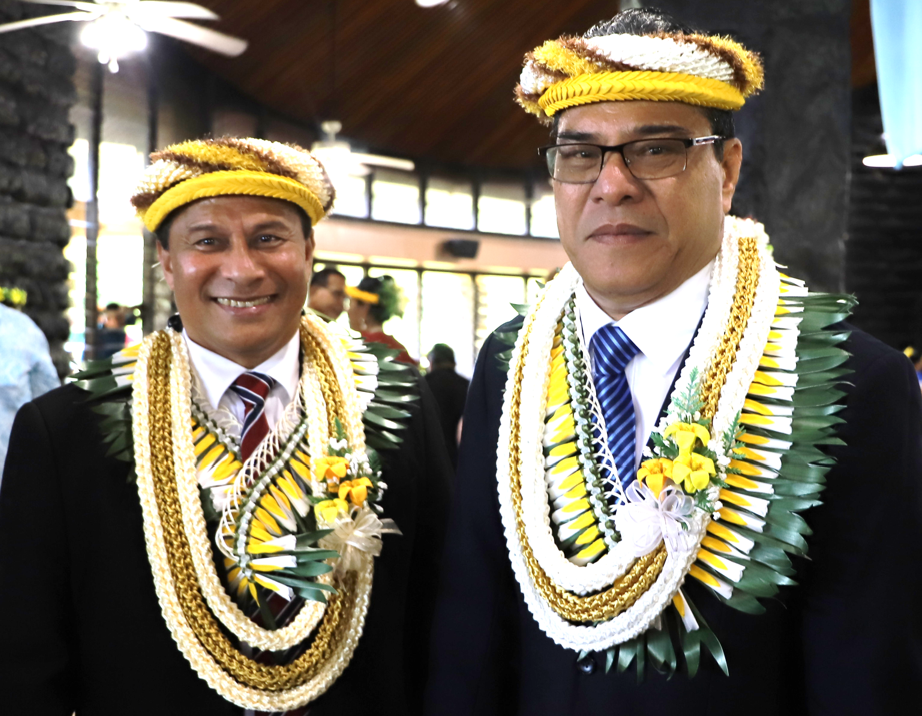
On May 11, the First Session of the 23rd Congress of the Federated States of Micronesia (FSM) elected the Honorable Wesley W. Simina, Senator-at-Large for Chuuk State, the FSM’s 10th President, succeeding David Panuelo of Pohnpei State. The Congress re-elected the Honorable Aren B. Palik of Kosrae State Micronesia’s Vice President. The election is fresh evidence of the FSM’s political resilience and constitutional vitality in the face of serious physical, geographical, and cultural governance challenges and recurring secessionist tendencies.
The physical and geographic challenge can hardly be understated. The FSM is an archipelago in the Caroline Islands comprised of 607 islands. Their aggregated land area barely equals half of that of Guam but scattered across the vast expanse of Western Pacific (an area roughly equal in size to the continental United States). Some islands are mountainous, with triple canopy forest; others are low-lying sun-bleached coral atolls. The environment is unforgiving for machinery and infrastructure. What the ocean does not take, its moist, salt air will rust, and the ever-encroaching jungle will soon reclaim.
Apart from the Polynesians of Nukuoro and Kapingamarangi, the inhabitants of these islands are homogeneously Micronesian. Distant and isolated, each island grouping evolved its own distinct culture and language. But colonized by Spain, then Germany, and next Japan, they also came to share a history and collective identity with each other and with the Northern Mariana Islands, Palau, Guam, and the Marshall Islands.
Except for Guam, which reverted to its previous territorial status, these many islands in 1947 became the Trust Territory of the Pacific Islands (TTPI), when the United States took over their administration on behalf of the United Nations. Washington promoted their unity under a constitution drafted by the TTPI Congress of Micronesia, seated in Saipan. But, when offered the choice in a 1975 referendum, the Northern Mariana Islands voted to become an unincorporated territory and commonwealth of the United States, and, three years later, Palau and the Marshall Islands opted to pursue their individual destinies separately. Chuuk, Kosrae, Pohnpei, and Yap accepted the constitution, binding them in a federation that became the FSM.
The former TTPI members continue to maintain close relations with the United States and with each other. The Marshall Islands, Palau, and the FSM maintain a relationship of political free association with the United States, in which they enjoy full sovereignty and pursue independent foreign policies but rely for their defense on the United States.
These Micronesian islands’ relationship with South Pacific island nations was temporarily strained in 2021 over the issue of leadership representation in the Pacific Islands Forum (PIF). During this period, the Micronesian countries, acting in solidarity, announced they would leave the PIF, but the June 2022 Suva Agreement mended the rift by reforming the organization’s leadership structure to ensure continual representation for each of the Pacific’s three racial power blocs — Melanesian, Micronesian, and Polynesian. The PIF also committed to codifying in writing what earlier had been understood to be a “gentlemen’s agreement” to rotate the leadership among the three blocs, beginning with installing a Micronesian as the PIF’s next Secretary General.
A “gentlemen’s agreement” was thought to govern, too, how the FSM Congress selected its president — a tacit understanding that the presidency would rotate among the four states. The understanding largely held until Panuelo succeeded fellow Pohnpeian Peter Christian, even though Kosrae State seemed due its turn. As though as consolation, Kosrae’s at-large senator was instead elected vice president. Palik’s re-election makes this the fifth presidential term in a row in which Kosrae holds the vice presidency.
Strictly honoring the gentleman’s agreement should have devolved the presidency to Vice President Palik. On the other hand, Chuuk is the neediest state in the FSM, represents nearly half of the FSM population, commands the largest representation in the FSM Congress, and would be chronically disadvantaged by a simple rotational arrangement. Additionally, then-Speaker Simina was the most senior of the four at-large senators. The other senators-at-large, Yap’s Joseph Urusemal and Pohnpei’s Christian, already had served as president. In the broader context of FSM politics, then, Simina’s election made perfect sense and was largely predictable. And if Kosrae’s Palik can win re-election to his at-large senate seat, he is a virtual shoo-in to become the next FSM president.
A referendum on Chuukese secession has been postponed repeatedly and now indefinitely, but the threat of secession still hangs over the FSM like a Sword of Damocles. Presumably Simina’s election will help to dampen this secessionist sentiment and also give impetus to some proposed constitutional amendments that would benefit Chuuk especially, such as the proposal to elect the president and vice president of the FSM on the basis of a direct popular vote. Other important proposals facing Simina and the FSM include one to allow dual citizenship and another to share with the states over 50 percent of the proceeds from fishery fees.
Direct elections on the basis of a popular vote might seem more democratic and translate more nearly into “one man, one vote,” but the greater political power this would give Chuuk would come at the expense of greatly marginalizing and disenfranchising Kosrae and Yap.
The FSM’s remarkable experiment in federalism has worked by balancing the stronger state governments against a weak federal government. It also has benefited from the leadership of a small but generally highly competent, experienced, and pragmatic cadre of officials drawn mostly from the private sector. Having served as Chuuk’s governor and senator-at-large, and as FSM Speaker, President Simina is cut from this mold. Nobody understands Chuuk’s unique challenges better than he. But if FSM nationhood is to continue to develop and mature, the new president will need to reconcile the parochial desires of his native state with the broader interests of the nation.